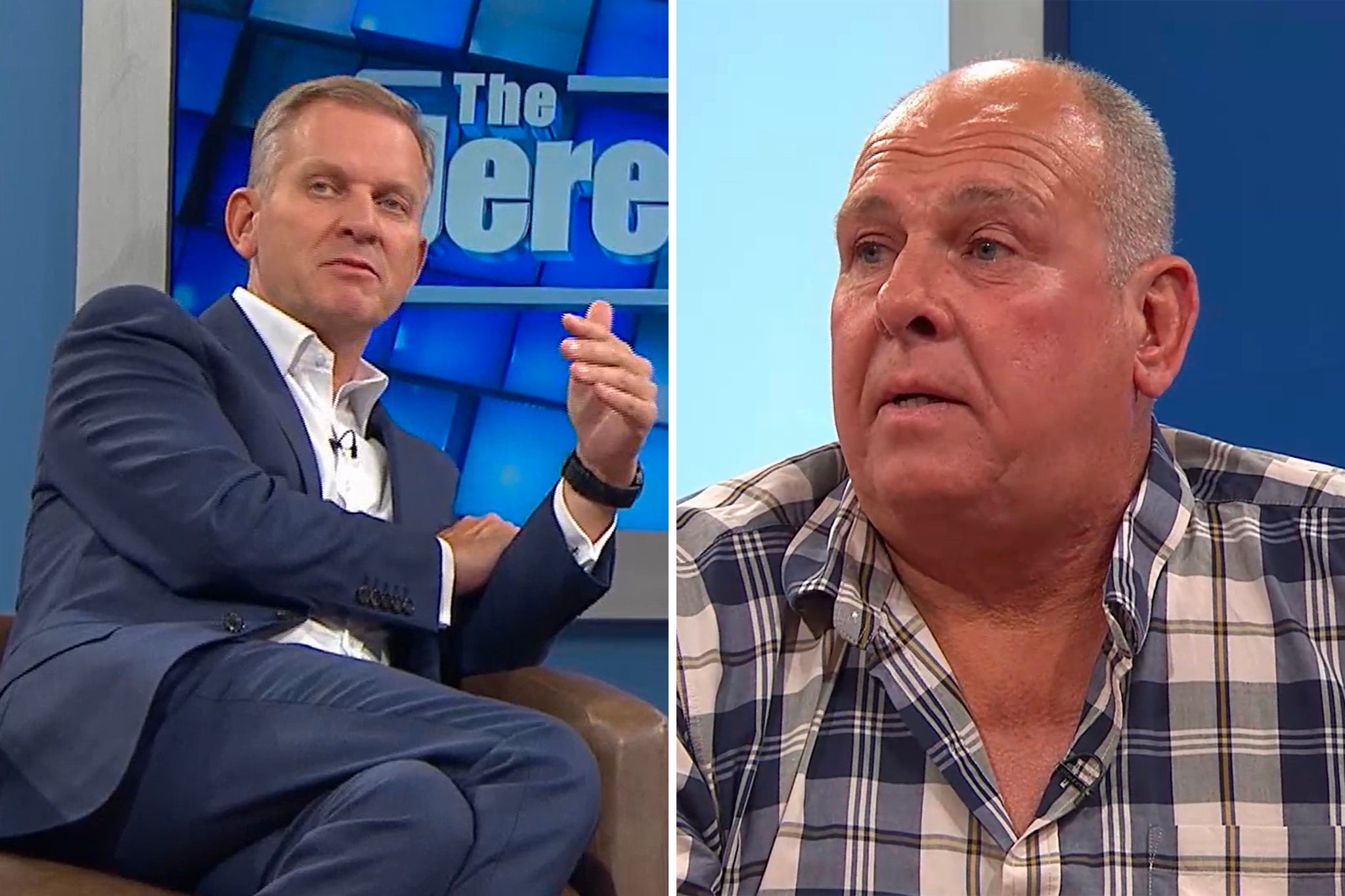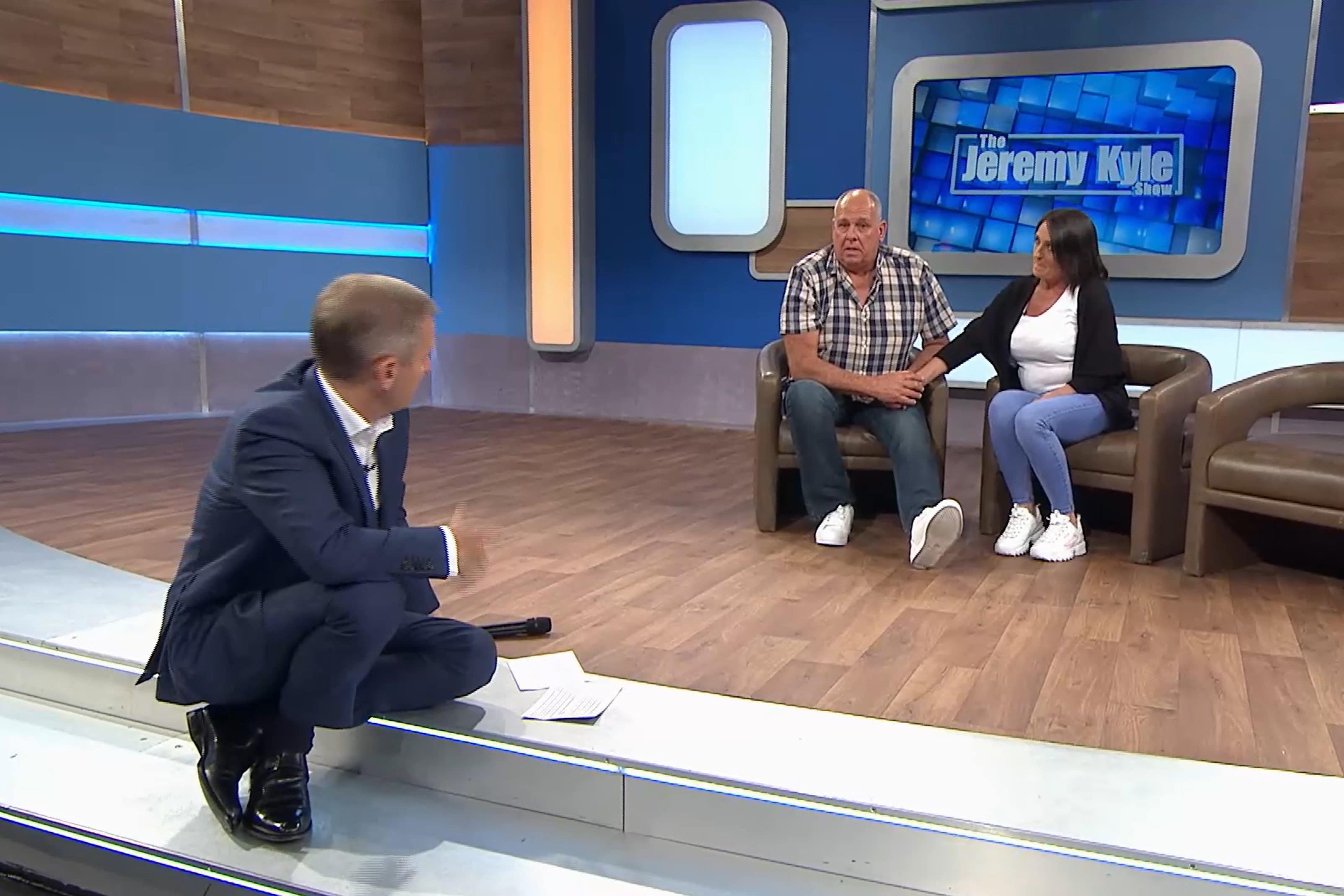Coroner says ‘no causal link’ between The Jeremy Kyle Show and death of guest
The coroner added that aftercare records indicate Steve Dymond expressed no dissatisfaction about his treatment

Your support helps us to tell the story
From reproductive rights to climate change to Big Tech, The Independent is on the ground when the story is developing. Whether it's investigating the financials of Elon Musk's pro-Trump PAC or producing our latest documentary, 'The A Word', which shines a light on the American women fighting for reproductive rights, we know how important it is to parse out the facts from the messaging.
At such a critical moment in US history, we need reporters on the ground. Your donation allows us to keep sending journalists to speak to both sides of the story.
The Independent is trusted by Americans across the entire political spectrum. And unlike many other quality news outlets, we choose not to lock Americans out of our reporting and analysis with paywalls. We believe quality journalism should be available to everyone, paid for by those who can afford it.
Your support makes all the difference.A coroner has ruled that The Jeremy Kyle Show’s treatment of Steve Dymond was not a “contributory factor” in his death. A statement released on behalf of Jeremy Kyle said the presenter has been “exonerated” by the finding.
Dymond, from Portsmouth, Hampshire, took his own life seven days after filming for The Jeremy Kyle Show in May 2019. The 63-year-old became “distraught” after he failed a lie-detector test, which he had taken in the hope of proving that he had not cheated on his fiancee Jane Callaghan, from Gosport.
Coroner Jason Pegg said: “The deceased’s decision to take his own life was made in the context of his mental distress that was probably exacerbated by his belief that a significant relationship had now irretrievably broken down following his participation on a television programme where it had been suggested that the deceased had lied to his partner.”
Dismissing The Jeremy Kyle Show as a “direct cause of Steve Dymond’s distress”, Mr Pegg said: “It would be unsafe to infer these links in the absence of a clear and reliable causal connection. Steve Dymond’s participation in the show is one of a number of factors, and whilst possible that the manner of his experience added to his distress, it is not probable.
“The weight which can be attached to these accounts must be balanced with the other evidence available in the aftermath of the show, including Steve Dymond’s own reliability, the evidence from witnesses and the rush recordings. Aftercare records indicate Steve Dymond was ‘emotionally contained’ and expressed no dissatisfaction towards his treatment during the recording, with a plan for follow-up CBT support.”
Mr Pegg added: “At that time, The Jeremy Kyle Show was a well-known show; the presentation style of Jeremy Kyle, which could be critical of guests, was known. Steve Dymond had viewed The Jeremy Kyle Show before and was aware of Jeremy Kyle’s presenter style.”

Mr Pegg said there was “insufficient evidence” for him to be satisfied that Mr Dymond had lied during the lie-detector test.
He added: “There are a number of possibilities as to why Steve was distressed following the reveal of the results. Possible examples could be that Steve had indeed been telling the truth; it’s possible Steve was being manipulative, or appreciated the consequence of the impact to his relationship.”
A statement released after the inquest on behalf of Mr Kyle said the ITV presenter had been “exonerated” by the coroner’s ruling.
The statement said: “His Majesty’s coroner has today clearly and unequivocally found that Jeremy Kyle did not in any way cause or contribute to the tragic suicide of Steve Dymond. He is now exonerated of that ill-informed accusation and his name has finally been cleared.
“Out of respect for the family of Mr Dymond and the judicial process, Jeremy has always maintained that it would be inappropriate to discuss details whilst the legal inquest was ongoing, and he has remained steadfastly silent in the face of lies, false accusations and unfair criticism over the last five and a half years.
“This has taken a huge toll on him and his family, and he would like to thank everyone who has truly supported him through these tough times.”
Mr Dymond’s son Carl Woolley said the “only good thing” that had come from his father’s death was that The Jeremy Kyle Show had been cancelled. In a statement read outside the inquest by one of the family’s solicitors, Mr Woolley said: “It has been five years since my father died. In my view, anyone watching the clips of the show would see that he was in tears, and spoken to in the most brutal way by Jeremy Kyle.
“The coroner has recorded that the lie-detector test, in which Jeremy Kyle believes so strongly, can have an accuracy of 60 to 96 per cent. The only good thing that came from my father’s death is that The Jeremy Kyle Show is cancelled.”
ITV said in a statement following the inquest that it is “committed to continuing to evolve and strengthen the care” of guests on its shows.
The broadcaster said: “We extend our deepest sympathies to those close to Mr Dymond and recognise how difficult the inquest and the past five years have been for them. The coroner did not find any causal link between Steve Dymond’s appearance on The Jeremy Kyle Show and his death.
“In the coroner’s findings of fact, he confirmed that The Jeremy Kyle Show had comprehensive duty-of-care processes covering the selection of contributors who appeared on the show and their care both during and after filming. The coroner described how these processes were followed with Steve Dymond, including the offer of follow-up cognitive behavioural therapy support.
“ITV is committed to continuing to evolve and strengthen the care given to all those who take part in our shows, which we believe set industry-leading standards for the selection, protection and support of participants.”
Mr Pegg recorded a conclusion of suicide, with the cause of death as overdose of a prescribed medicine and left ventricular hypertrophy. He added that Mr Dymond had left notes for his family, and said: “There is nothing in those notes where Mr Dymond is critical of his treatment by the show.”
Mr Dymond had been diagnosed with a depressive disorder in 1995 and had taken overdoses on four occasions – in January 1995, twice in December 2002, and in April 2005, the court was told. It also heard that he had attempted to harm himself in December 2002.
The inquest was told that Mr Dymond had called the show 40 to 50 times in “desperate” attempts to be a guest in an effort to prove he had not been unfaithful. His first application to attend the show was rejected in early April because he had been diagnosed with depression and prescribed medication. He then obtained a letter from his GP, Dr Amjad Rehman, stating that he had not taken the medication and that his mood had improved.
He was subsequently assessed by Steph MacDonald, a mental health nurse employed by the show, as suitable to appear, as he had not “scored for depression” in her evaluation of him.
Mr Kyle defended his handling of Mr Dymond during the recording on 2 May, saying he had tried to “de-escalate” the situation and adding that the selection of guests and their aftercare “were not my responsibility, I was the presenter”.
In clips of the recording shown to the hearing, Mr Kyle is heard to tell Mr Dymond: “The studio thought you were telling the truth. I wouldn’t trust you with a chocolate button, mate.”
Following the recording, Mr Dymond was described as being “distraught” and a “broken man”.
If you are experiencing feelings of distress, or are struggling to cope, you can speak to the Samaritans, in confidence, on 116 123 (UK and ROI), email jo@samaritans.org, or visit the Samaritans website to find details of your nearest branch. If you are based in the USA, and you or someone you know needs mental health assistance right now, call or text 988, or visit 988lifeline.org to access online chat from the 988 Suicide and Crisis Lifeline. This is a free, confidential crisis hotline that is available to everyone 24 hours a day, seven days a week. If you are in another country, you can go to www.befrienders.org to find a helpline near you
Join our commenting forum
Join thought-provoking conversations, follow other Independent readers and see their replies
Comments